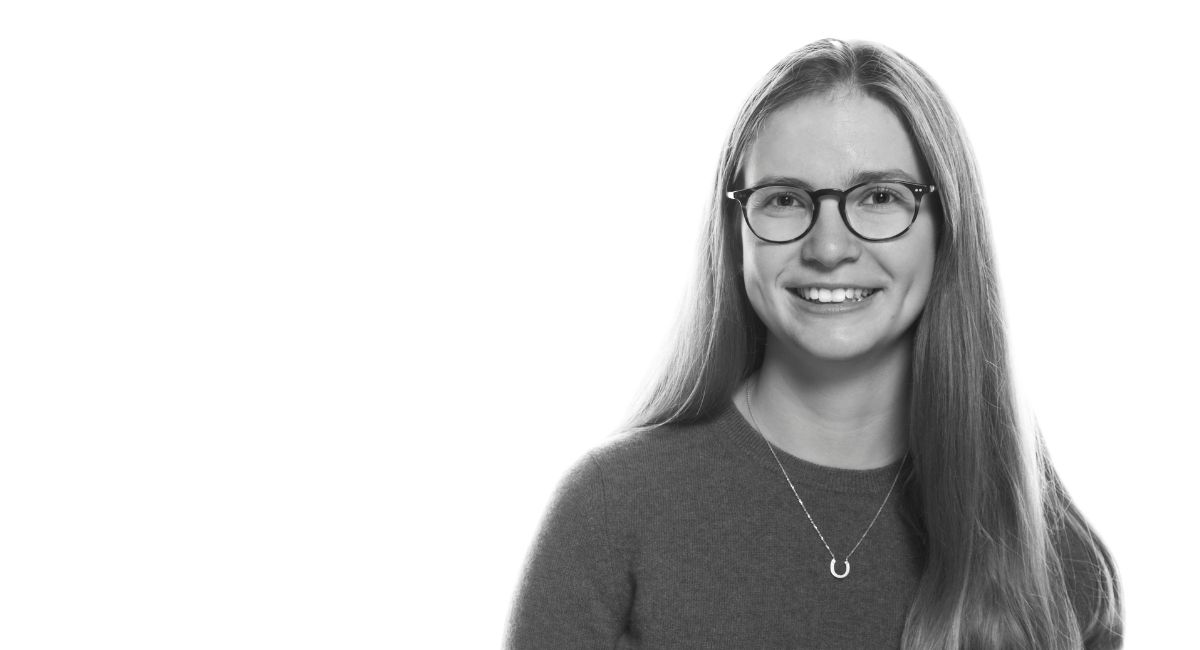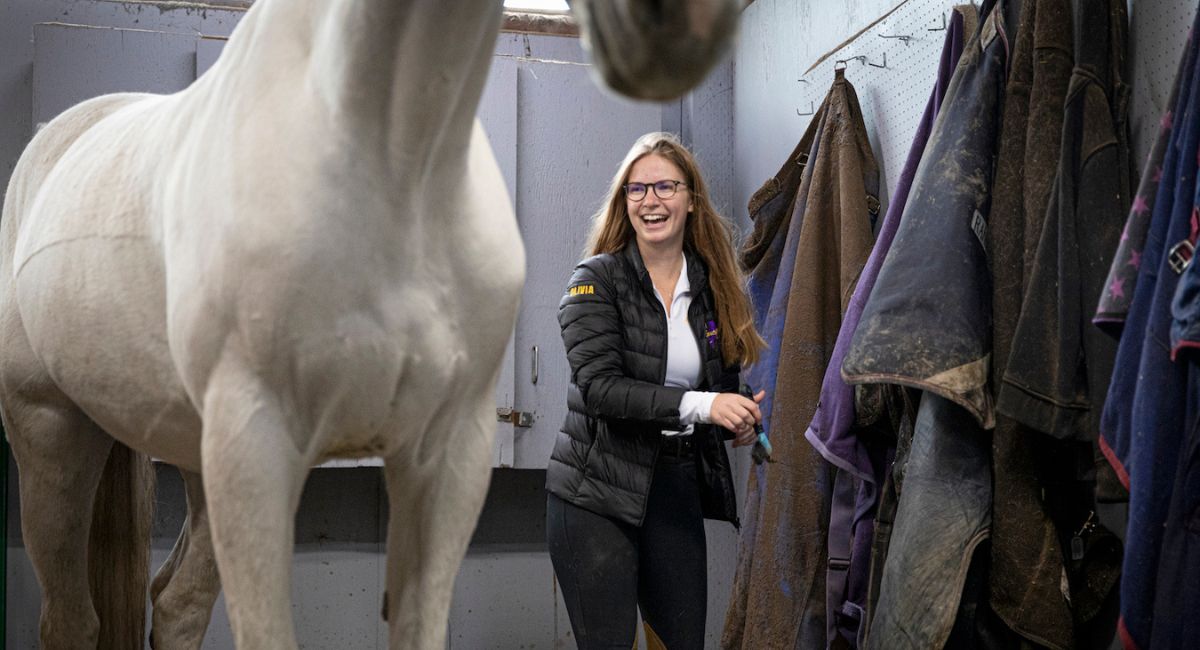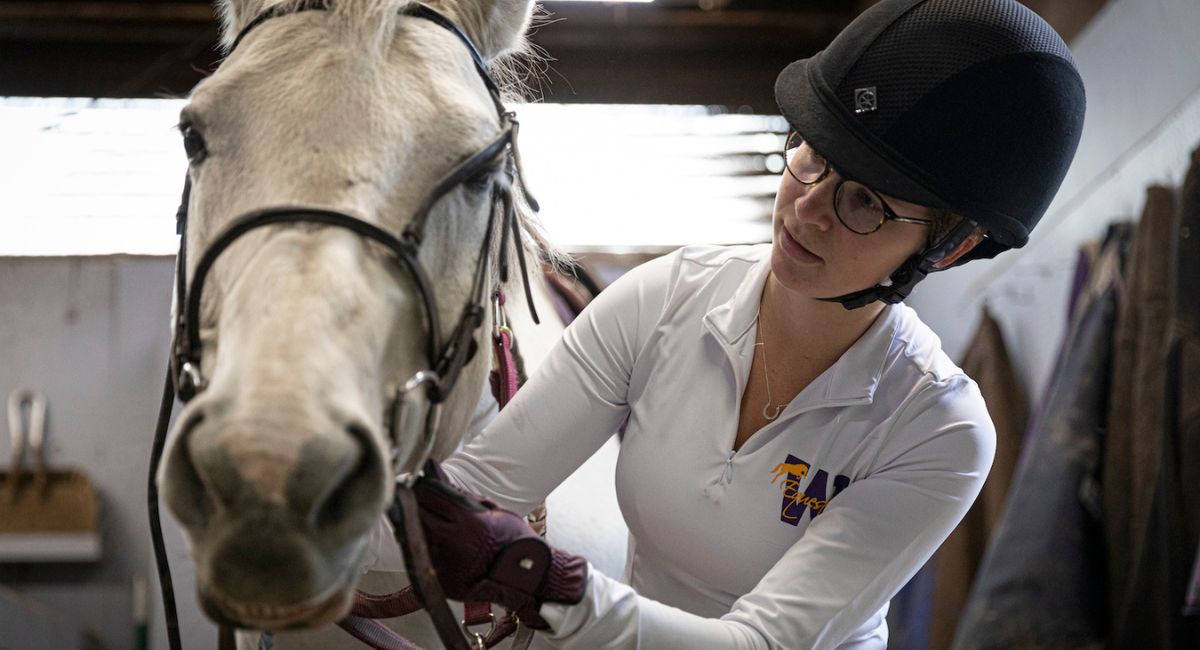
Olivia Brandon’s interests in health care swing from micro to macro.
She loves sodium — not the variety most of us love at dinner time — but the element sodium and its impact on infant health. She’s so passionate, her lab peers will tell you she’s salty about it.
She loves the cerebellum, the part of the brain that helps you know where you are in space, even when you close your eyes. Her favorite fun fact is that, even though the cerebellum is so small, it contains more neurons than the rest of the brain. But the thing that really makes her jaw drop is how little is known about it, compared to how much it does.
That’s another thing she loves: unknown questions. The idea of combing through datasets on global health to answer questions excites her so much that she’ll pick hours researching in the lab over homework any day.
Most importantly, she wants the work she does to make an impact, both at the level of an individual person’s life and at a large scale that can lead to more equitable health care systems. Perhaps that’s why she chose to double major in two disciplines at opposite ends of the micro and macro spectrum: neuroscience and public health-global health.
“I think of global health as a macro view on health; how do we give people the tools and resources they need to be healthy?” Brandon said. “I think of neuroscience on a micro scale; now that we have a baseline healthy person, how can we improve their responses to injury at the cellular level? How do we design interventions?”
Brandon, now a senior, has been excelling in her studies and was awarded the University of Washington President’s Medal. From the thousands of undergraduate students at the UW, three are selected each year for the prestigious honor and this is the second time Brandon has received it. Awardees are selected for their high GPAs, rigor of classes and number of honors courses.
"Olivia is an exceptional colleague,” said Thomas Wood, research assistant professor at the UW and PI of the lab Brandon works in. "As a scientist she combines hard work with boundless curiosity, but she also contributes to the lab in numerous other ways. One day she'll be counting cells and analyzing data and the next day she'll be teaching her lab mates how to ride a horse while organizing our (now annual, thanks to Olivia) secret santa! It has been a joy to have her in the lab and we're all very excited to see what she does in the future!"

Brandon was born and raised in Seattle. She has been riding horses since age six and became a self-appointed rescuer of stray cats, sometimes crowding the house with as many as eight. Her interest in global health began as a high school student, when she did an independent study on sustainable cooking methods in Zambia. She researched ways to improve water purification and combat charcoal emissions in the country. Brandon also visited Zambia where she was first exposed to rural medical clinics focused on reducing maternal and infant mortality as well as tuberculosis clinics and a research center focused on eliminating malaria.
She came to the UW both because she loved the area (yes, especially the rain) and valued the strength of School of Public Health’s undergraduate program. However, Brandon hadn’t taken many science courses in high school, and thought she was better suited for a pre-law track to focus on improving global health through policy.
A “survey of physiology” course changed that. The first few weeks were brutal, and Brandon found herself visiting Teaching Professor Karen Petersen’s office hours for help. But the more she learned, the more she loved science, from its focus on problem solving to exploring the unknown. She kept adding science courses to her schedule, and then made the switch from pre-law to pre-med.
Her love of research began when she became a research assistant at the Neonatal Neuroscience Laboratory, run by PIs Thomas Ragnar Wood and Sandra Juul. They gave Brandon training in data analysis, and allowed her to take ownership over asking questions of the data and researching answers. She was able to pursue unanswered questions, such as the importance of serum sodium imbalances in newborns, in collaboration with Drs. Gregory Valentine, Krystle Perez, and Sarah Kolnik. This led to her first published paper, and her honorable nickname “salty” amongst her lab peers.
“Research doesn't have to be a grand, huge thing,” Brandon said. “If anything, research is more impactful at a small scale. There’s always a gap of knowledge, whether that’s sodium in preterm newborns or whether it’s an unknown drug. What I love about research is you can take this unknown gap of knowledge, and you can answer that with data or clinical trials to find an answer that actually improves care on whatever scale you want.”
“We’re working in a health care system that benefits certain subgroups much more than others, and I want to work toward fighting against the current system to improve health equity.”
Brandon has been involved in the lab’s research on brain injury among infants (called hypoxic ischemic encephalopathy). This brain injury is caused by lack of blood flow, and therefore oxygen to the brain, which can lead to neonatal morbidity and mortality.
With a fellowship from the Washington Research Foundation this year, Brandon was able to pursue an independent study. She chose to look into a little-researched question: why the brain of a ferret is so resilient to brain injury. Understanding whether ferrets have a specific gene or protein that enables this resiliency could uncover interventions for preterm babies or others who experience brain injury.
As much as Brandon loves to get into the microscopic details of neuroscience, she also explains that it’s important to take a public and global health perspective on health care to understand how social determinants of health and a community’s equitable access to resources underlies many of the issues she studies.
“I spend all this time talking about newborn brain injury, but one of the leading risk factors for brain injuries is small birth weight,” Brandon said. “Right now in America, Black women give birth to smaller babies, so before we even get to the brain intervention level, the question is, why are Black women having smaller babies? It’s systemic racism. It’s all these social determinants of health that matter more before you actually get to the treatment.”
Equity is a major driving force behind Brandon’s goals as she becomes a health professional. She hopes to attend medical school after finishing her undergraduate degrees so she can become a physician and make an impact on individual patients’ lives. But she also wants to make an impact on health care systems more broadly, which is why she’s also considering pursuing a medical scientist training program (a dual MD-PhD program), where she can continue chasing down unknown questions.
“We’re working in a health care system that benefits certain subgroups much more than others, and I want to work toward fighting against the current system to improve health equity,” Brandon said.
Her work in equity extends to another passion of hers: horses. Brandon grew up around horses as a rider and competitor.
“I love the partnership among horse and rider during practice and competition,” Brandon said. “It is not only about strength and accuracy but also communication and trust. I want to be an advocate for horse welfare and give back to the horses that give so much to us.”

As president of the UW Equestrian Team, Brandon and the team’s mission is to make horses accessible to everyone at the UW. While horse riding has become inaccessible for most due to the cost, anyone can ride horses on the UW team, regardless of income or experience.
In fact, having little to no experience is an asset on the team, as competitions require riders at every level of ability in order to compete. This makes the sport team-oriented, which has helped Brandon develop a community at the UW.
“I love seeing how close the team gets after every season, bonding over our shared love for animals and the team atmosphere,” Brandon said. “Winning or losing, the team has been my greatest support.”
Her advice for other students is to seek out these communities around campus to help find support and areas of passion.
As for Brandon’s passion, learning the big and the small of public health will be lifelong.
“If being a student paid better, I would be a student my whole life,” Brandon said.